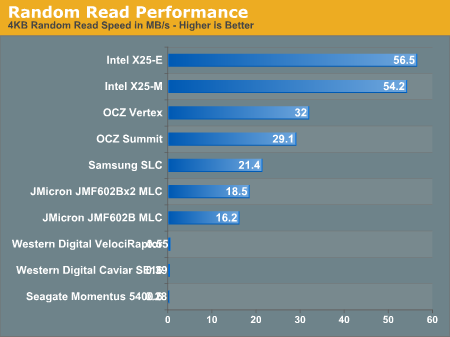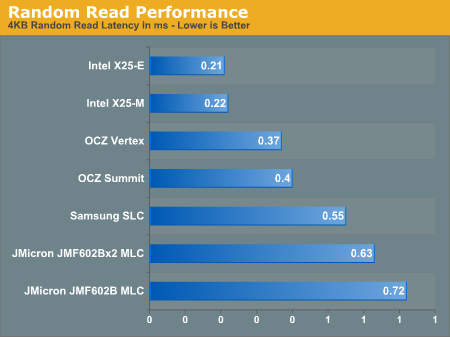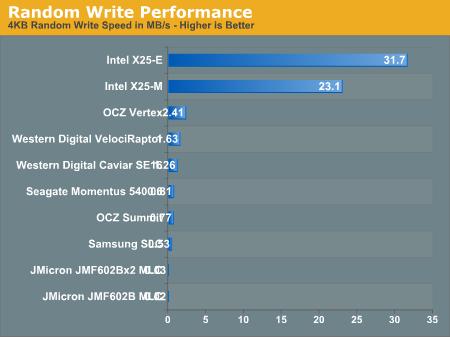The SSD Anthology: Understanding SSDs and New Drives from OCZ
by Anand Lal Shimpi on March 18, 2009 12:00 AM EST- Posted in
- Storage
Random Read/Write Performance
Arguably much more important to any PC user than sequential read/write performance is random access performance. It's not often that you're writing large files sequentially to your disk, but you do encounter tons of small file reads/writes as you use your PC.
To measure random read/write performance I created an iometer script that peppered the drive with random requests, with an IO queue depth of 3 (to add some multitasking spice to the test). The write test was performed over an 8GB range on the drive, while the read test was performed across the whole drive. I ran the test for 3 minutes.

The three hard drives all posted scores below 1MB/s and thus aren't visible on our graph above. This is where SSDs shine and no hard drive, regardless of how many you RAID together, can come close.
The two Intel drives top the charts and maintain a huge lead. The OCZ Vertex actually beats out the more expensive (and unreleased) Summit drive with a respectable 32MB/s transfer rate here. Note that the Vertex is also faster than last year's Samsung SLC drive that everyone was selling for $1000. Even the JMicron drives do just fine here.
If we look at latency instead of transfer rate it helps put things in perspective:

Read latencies for hard drives have always been measured in several ms, but every single SSD here manages to complete random reads in less than 1ms under load.
Random write speed is where we can thin the SSD flock:

Only the Intel drives and to an extent, the OCZ Vertex, post numbers visible on this scale. Let's go to a table to see everything in greater detail:
| 4KB Random Write Speed | |
| Intel X25-E | 31.7 MB/s |
| Intel X25-M | 23.1 MB/s |
| JMicron JMF602B MLC | 0.02 MB/s |
| JMicron JMF602Bx2 MLC | 0.03 MB/s |
| OCZ Summit | 0.77 MB/s |
| OCZ Vertex | 2.41 MB/s |
| Samsung SLC | 0.53 MB/s |
| Seagate Momentus 5400.6 | 0.81 MB/s |
| Western Digital Caviar SE16 | 1.26 MB/s |
| Western Digital VelociRaptor | 1.63 MB/s |
Every single drive other than the Intel X25-E, X25-M and OCZ's Vertex is slower than the 2.5" Seagate Momentus 5400.6 hard drive in this test. The Vertex, thanks to OCZ's tweaks, is now 48% faster than the VelociRaptor.
The Intel drives are of course architected for the type of performance needed on a desktop/notebook and thus they deliver very high random write performance.
Random write performance is merely one corner of the performance world. A drive needs good sequential read, sequential write, random read and random write performance. The fatal mistake is that most vendors ignore random write performance and simply try to post the best sequential read/write speeds; doing so simply produces a drive that's undesirable.
While the Vertex is slower than Intel's X25-M, it's also about half the price per GB. And note that the Vertex is still 48% faster than the VelociRaptor here, and multiple times faster in the other tests.










250 Comments
View All Comments
VaultDweller - Wednesday, March 18, 2009 - link
I love it when people critique someone's critique of grammar... and get it wrong.It's an SSD, not a SSD.
gwolfman - Wednesday, March 18, 2009 - link
lolzsidex - Wednesday, March 18, 2009 - link
I would like to know the firmware version of Vertex used in your review. To me sounds the old 0112kensiko - Wednesday, March 18, 2009 - link
Yes that is important to know.I'm sure this is not done with the latest firmware available which is 1199. This version got better performance.
Firmware 1275 is coming also.
Anand, will you update your benchmarks with the latest firmware?
If not, then the benchmarks are obsolete.
Anand Lal Shimpi - Wednesday, March 18, 2009 - link
I tested with the shipping firmware for this article (0122). I've been playing around with 1199 in the lab and will most likely have an update in a couple of weeks once I've done a thorough evaluation of it. By then I should also have the final version of the new Samsung drive and maybe even some other interesting things.For now, I've got to get to work on the new Mac Pro and the updated Ion article :) I need a small break from SSDs por favor :)
Take care,
Anand
VaultDweller - Wednesday, March 18, 2009 - link
Awww, don't you have some underlings to do your SSD-related will?Would love to see an update, and would love to see Corsair's SSD drive tested as well (it's based on Samsung's last generation MLC controller, and doesn't seem to emphasize sequential like the Summit does).
Anand Lal Shimpi - Wednesday, March 18, 2009 - link
I will do an update on the new firmware, I just want to do it right so it'll take some time :)I'll put in a request for the Corsair drive as well :)
-A
Slash3 - Wednesday, March 18, 2009 - link
Page 29: "Not all applications will launch faster than a VelociRaptor on a SSD, but let's not forget that the VelociRaptor is the world's fastest hard drive."Really? What about the nice and speedy enterprise-level 15k SAS/SCSI drives everyone neglects to acknowledge? :)
George Powell - Wednesday, March 18, 2009 - link
I believe it refers to consumer drives. While SAS drives are beginning to be a possibility on the desktop with newer motherboards supporting them natively, the drives themselves are too expensive and too noisy for most consumers to actually want them.FishTankX - Wednesday, March 18, 2009 - link
Good info. However, I noticed one mistake.Second page
Samsung had a MLC controller at the time but it was too expensive than what SuperTalent was shooting for.